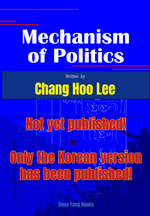Chapter 0. Contents of this
book

(2) Scientific Approach
In political phenomenology, a scientific
approach to politics is adopted. Let's examine why
such a perspective is necessary and what are the characteristics
of the scientific approach.
A 50-ton dump truck with its brakes
released is slowly moving, and a young child is about
to be hit. If someone tries to stop the truck with
their body, what will happen? His bravery may be praised,
but it cannot be considered a good act. Both he and
the child will be hurt. So, what should we do? The
better option is to get into the slowly moving truck
and fix the brakes.
Now the dump truck is moving very
slowly, but what should we do if we don't know anything
about the structure of the dump truck? With just 10
minutes, we could hear a simple explanation of the
structure and control of the truck and take action.
There is a huge machine called politics
in front of us. We know that sometimes many people
can save their lives and live a fruitful life by the
operation of this machine, but sometimes many people
also die or get hurt. Then we must understand and
explore the way this machine of politics operates
and find a way to effectively manipulate it. Political
phenomenology aims to do this. This is a scientific
approach. It means viewing politics as a huge machine
and exploring its operating principles.
The scientific approach referred
to as the "realistic viewpoint" of politics
is not exactly new. Many political scientists have
sought to study from this perspective and it has also
been referred to as the "behavioral approach."
We will briefly discuss the behavioral approach in
the final chapter of this book.
In political science, the traditional
approach (Historical Approach) is contrasted with
a scientific approach. The traditional approach involves
a detailed explanation of historical events that result
in a particular outcome, relying on individual cases
or stories. On the other hand, the scientific approach
provides useful general principles and offers a theoretical
explanation based on theoretical models. In the scientific
approach, it is important to clearly state basic assumptions,
maintain logical consistency, and systematically verify
theories through controlled case comparisons.
Can politics be viewed as a machine?
This question can be raised. Of course, not all of
politics can be perfectly likened to a machine. However,
it can be assumed that some aspects of politics change
(like a machine) based on their own operating method,
and in that case, it is necessary to understand that
aspect well. If politics consists of both mechanical
and human aspects, it can be thought of as a dump
truck being driven by a driver, just like in this
case, knowledge of the truck's structure is still
required. There is a driver, so first you shout to
stop in order to save the child, but if the driver
ignores such words, then someone who knows the structure
of the truck should get on board and fight with the
driver, if necessary, to step on the brake. In summary,
regardless of whether the mechanical aspect is large
or small, if one wants to understand that part, they
must understand it as much as possible.
  
|